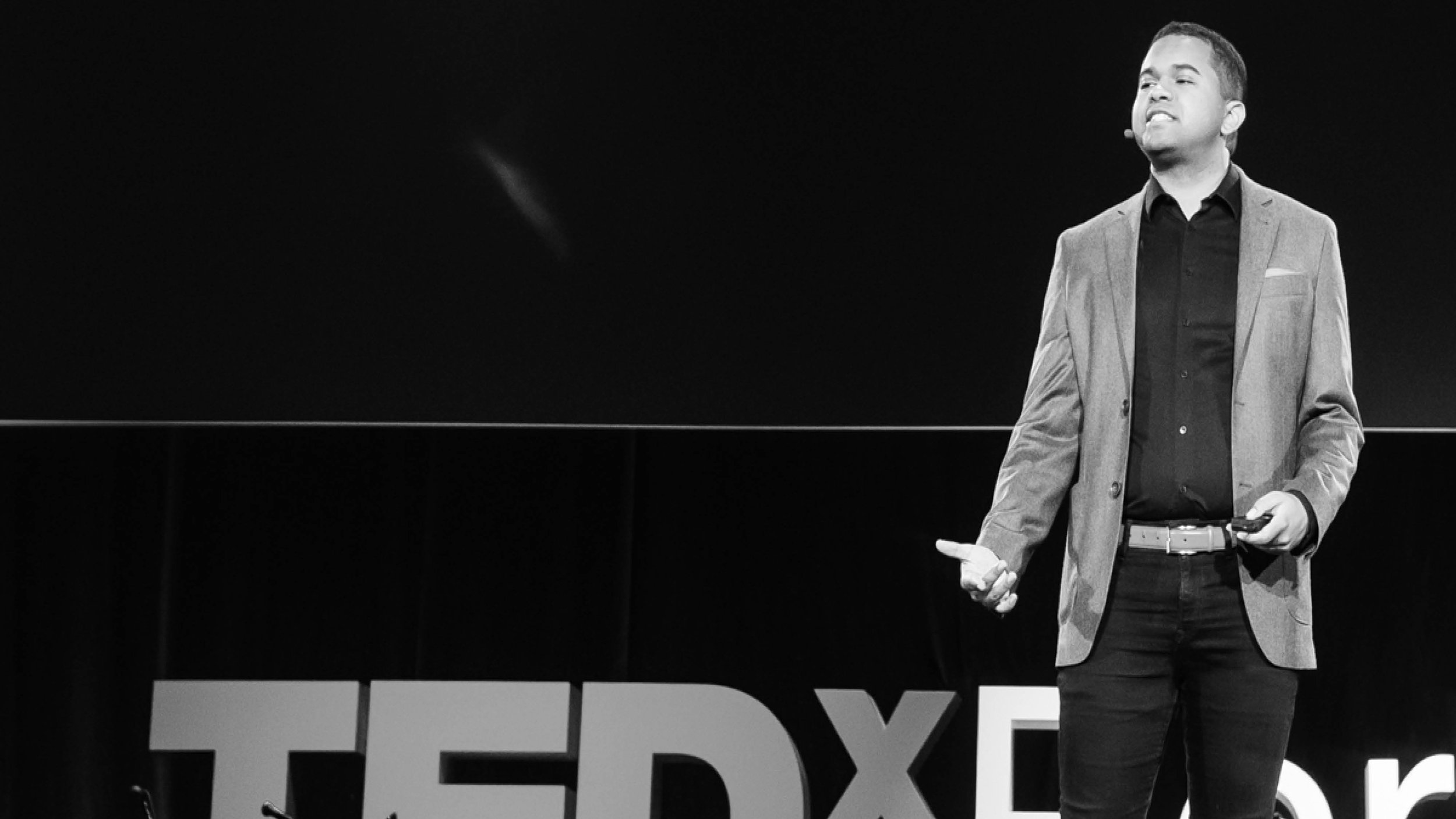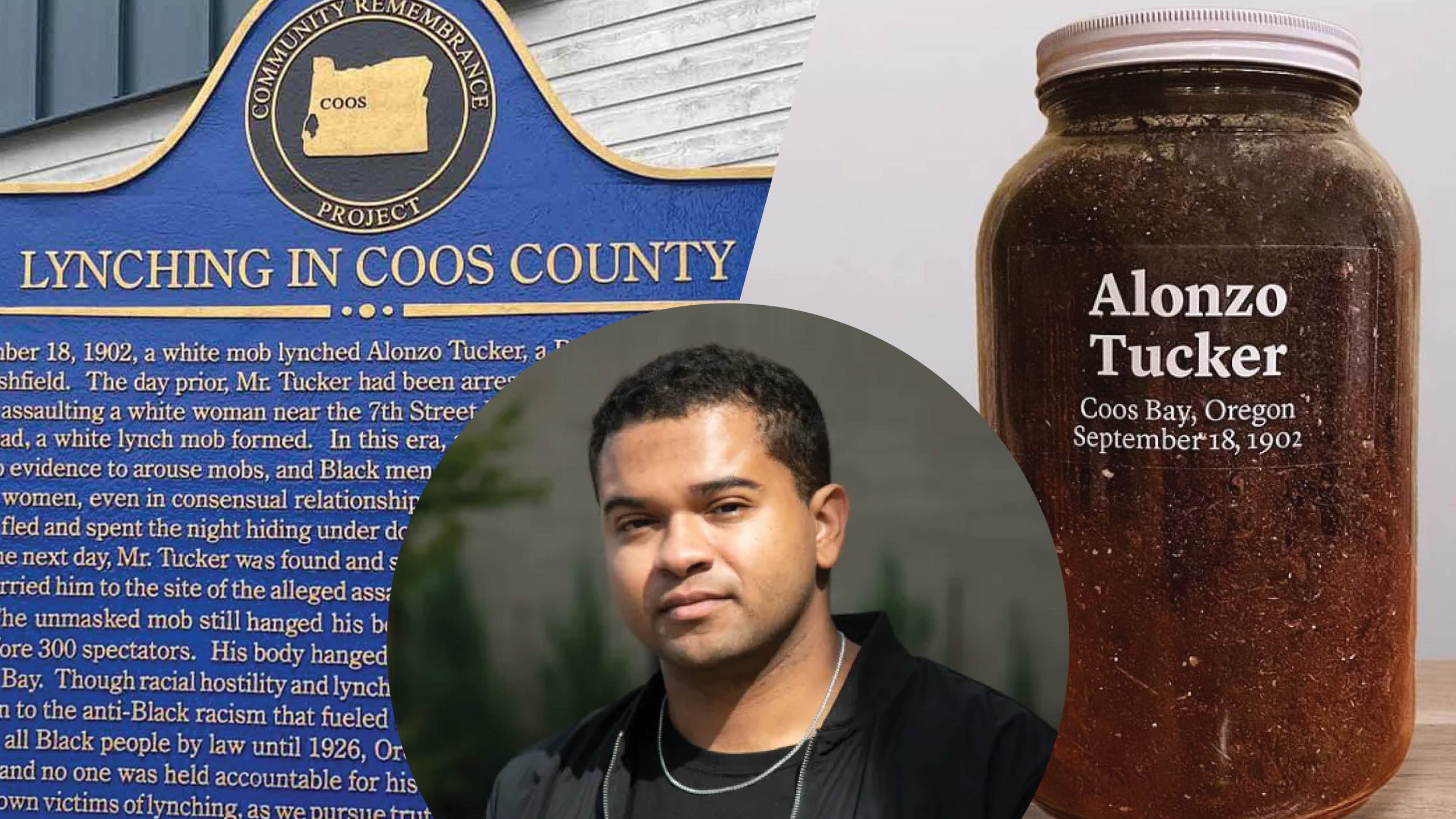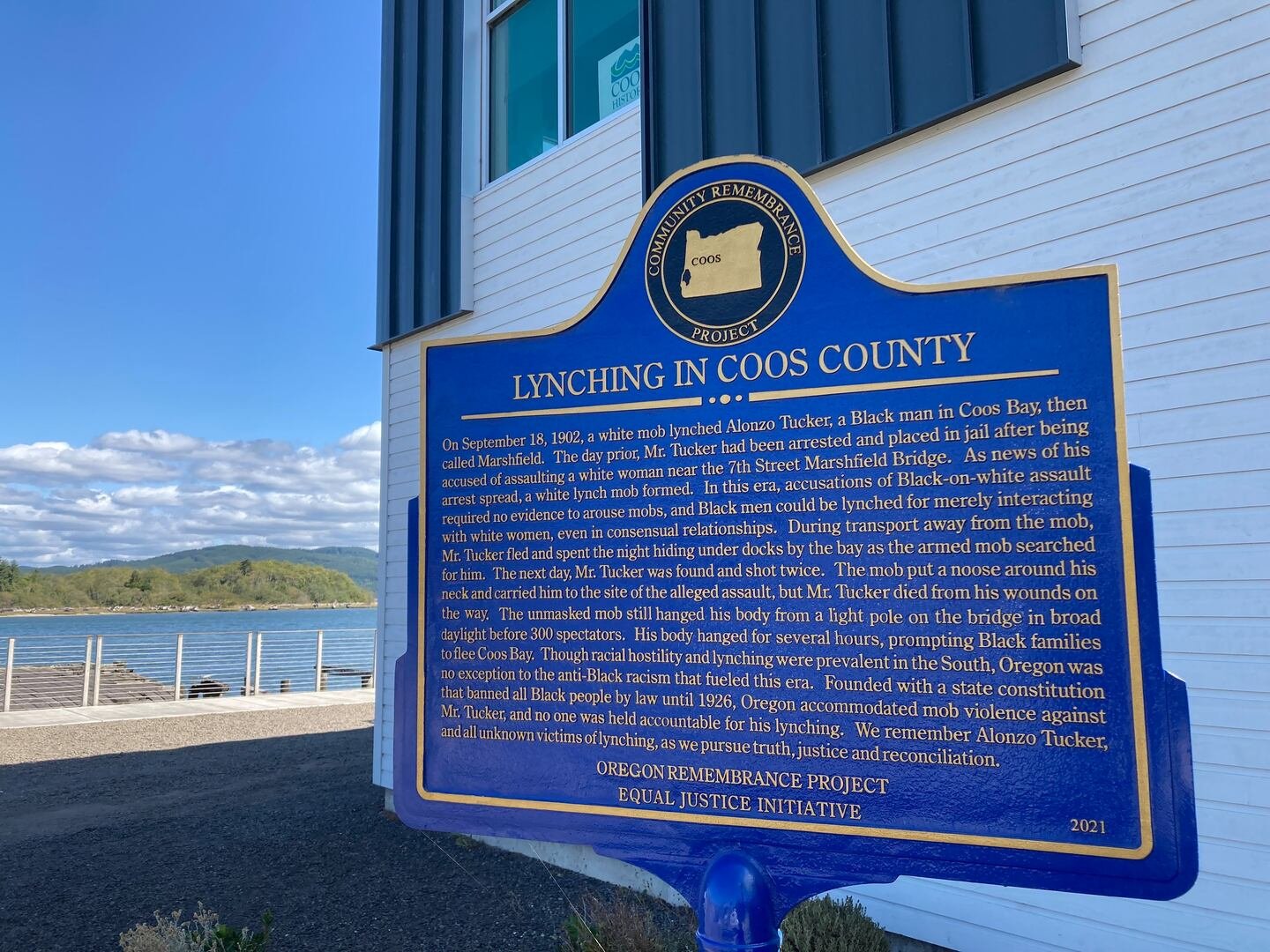Get to Know The Oregon Remembrance Project
“The work we do is something unique that hasn’t been done [in Oregon] before…We’re making a difference in communities across Oregon and for that reason I will keep pushing on.”
Looking to Oregon’s Past to Inspire a better future.
The Equal Justice Initiative, based in Montgomery, AL, has meticulously chronicled the haunting legacy of nearly 6,500 African American victims of lynching spanning the years 1865 to 1950. Oregon, too, bears witness to this history. One such victim was Alonzo Tucker, whose life was tragically cut short in a lynching in Coos Bay, OR, in 1902, witnessed by a crowd of 300.
Our next concert, Amendment: Righting Our Wrongs, showcases trailblazing composers, poets, and activists including Taylor Stewart, the visionary force behind the Oregon Remembrance Project. The Oregon Remembrance Project works with communities throughout Oregon to unearth stories of injustice and foster the necessary dialogue for healing and reconciliation. Taylor’s work began in Coos Bay, grappling with the question, “How do you reconcile a lynching?”
This week, we had the privilege of sitting down with Taylor to delve into the genesis of this groundbreaking movement and the transformative work that lies ahead.
Let’s get to know Taylor Stewart and the Oregon Remembrance Project.
Taylor Stewart, founder of ORP
Tell us a little bit about how you’re connected to Portland.
I’ve lived in Portland my whole life. I graduated from the University of Portland in 2018 with a degree in Communication and a Master’s in Social Work from Portland State University in 2021. I figure if I can’t change the whole world, or even the whole country, I might as well change where I’m from! So, I choose to do this work [with the Oregon Remembrance Project] in Oregon, and have plans to do so for the rest of my life.
Did you always have an interest in history? Or did that come to you later on?
No. I was never big into history. I spent my whole life wanting to be a lawyer. I knew since middle school that I was going to law school. I spent 90% of that time aspiring to be a criminal prosecutor because I wanted to be “tough on crime.” Ironically, I was a passionate supporter of the death penalty and even gave a speech my junior year of college in favor of capital punishment.
I had always been passionate about justice, and today my passion has never changed. The only thing that's changed is my understanding of injustice. In the case of capital punishment, I realized that this system that I had counted on to dispense the most ultimate form of justice was, in fact, too flawed to produce anything but injustice.
“I figure if I can’t change the world, I might as well change Oregon! ”
[After graduating from University of Portland,] I actually started at Lewis & Clark Law School in the fall of 2018 with a newfound passion to be a civil rights lawyer. However, I was only at law school for a day and a half. After a panel of current and former students on the first day made it clear to me that I would be beating my head up against a wall for three years if I expected the integration of topics such as race to be an integral part of my law school education, I had a feeling deep in my gut that I could do more good if I pursued a career outside of law. So, the next day I went into my advisor’s office, told her I was leaving, got in my car, and realized I had just hit “reset” on my entire life. I’ll never forget driving home that day wondering if I had just made the biggest mistake of my life.
From the National Memorial for Peace and Justice, one of the inspirations for the Oregon Remembrance Project’s founding.
Can you tell us a little bit about what inspired the founding of Oregon Remembrance Project?
Shortly after I graduated from the University of Portland in 2018, I went on the University’s Civil Rights Immersion [program] where we went to Alabama, Mississippi, and Arkansas. I had especially been looking forward to the portion of the trip where we would be going to Montgomery, AL because we had plans to see the Equal Justice Initiative’s new museums.
“I had lived in Oregon my entire life—I couldn’t believe that I had to go all the way to Montgomery, AL to learn that there had been at least one widely documented lynching of an African American in Oregon [Alonzo Tucker]. I couldn’t believe that this story wasn’t a part of the Oregon consciousness and I left these museums determined to share this history with others.”
In April 2018, EJI opened up the Legacy Museum, which chronicled the evolution of slavery, and the National Memorial for Peace and Justice, a memorial to the thousands of African American lynching victims. Visiting these museums was a powerful encounter with history for me.
In conjunction with the National Memorial for Peace and Justice, EJI had started the Community Remembrance Project, which aimed to hold a series of acts of remembrance in the communities in which the lynchings of African Americans occurred.
There was an interest form online about getting involved with the Community Remembrance Project and I would love to say that when I first saw that I was immediately like “Alright, sign me up!” But that wouldn’t be true. In fact, I was too nervous to fill out the interest form. I was a recent college grad with zero relevant experience and I figured to myself, “Who am I to really think that I could be of any help?”
So, I decided that I wasn’t going to fill out the interest form. Thankfully, two encounters from the rest of my trip inspired me to change my mind.
The first was a John Lewis quote of “If not us, then who? If not now, then when?” I don’t remember where I was when I first saw that quote but I remember getting that sinking feeling in my stomach as I realized that John Lewis was talking right at me. At this point, I still wasn’t ready to fill out the interest form but I began to think more seriously about it.
From Mississippi Civil Rights Museum, another inspiration for ORP’s founding.
“So, there at the Mississippi Civil Rights Museum, I learned that you don’t need to be an extraordinary person to do extraordinary things. I learned to start asking the question, “Why not me?””
The second encounter was at the Mississippi Civil Rights Museum. There they just focused on Mississippi history, so there was no Martin Luther King Jr., Rosa Parks, Malcolm X—individuals who we deify and are hard to relate to. Instead, the museum focused on the stories of everyday Mississippians who did their part to pave the way for justice.
This ultimately gave me the courage to reach out to Equal Justice Initiative, and never in a million years did I think that doing so would completely alter the trajectory of my life.
So, amid all of those experiences, it was really the Equal Justice Initiative’s work that rallied you?
Founder of the Equal Justice Initiative (EJI), Bryan Stevenson, pictured at The Legacy Museum.
Bryan Stevenson, executive director of EJI, is my personal hero. I actually got to see him in-person one time when he spoke at Beth Israel Synagogue in 2019. Bryan gave his usual speech about how we need to be more proximate to the things we need to change, but what he said at the very end is what stood out to me the most. He said, “The next time I come back to Portland, I want you to have gotten rid of your death penalty in Oregon. So, me, standing in the very back, thought to myself, “Ok, Bryan. I’ll try my best.” I had the opportunity to introduce Bryan for a conference in 2021 and I told him that I was going to end the death penalty in Oregon so that he could come visit me.
Did the connection with EJI result in the Oregon Remembrance Project?
Yes, in collaboration with the EJI Community Remembrance Projects. The Oregon Remembrance Project began simply—as a means to reconcile the lynching of Alonzo Tucker, Oregon’s most widely documented African American victim of lynching—but I’ve grown to see the power of reconciliation to rectify further instances of historical injustice.
Taylor worked with the community of Coos Bay, Oregon for three years to properly memorialize Alonzo Tucker.
In February 2020, a crowd of 200 gathered for a soil-collection ceremony near the spot where 28-year-old Alonzo Tucker was killed in 1902. The soil was collected from three locations and each bit of soil told part of Alonzo Tucker’s story. On June 19, 2021, the community gathered to pay witness to the unveiling of Alonzo Tucker’s historical marker.
Taylor Stewart led the Grants Pass Remembrance at the Boatnik parade in May 2023. A community parade that the KKK used to march in, their goal was to replace the shadow of those white hoods with the brightness of their yellow t-shirts.
That project in particular really solidified your path forward, then?
I’ve found my passion in storytelling, and I think of the historical education that I do now as just that—storytelling. What I like about thinking about “history as stories,” and in particular stories of injustice, is that it empowers us to determine what we want the end of the story to be.
If there’s a story of historical injustice that upsets us, let’s simply change the ending to the story. It’s that simple. The things we do contemporarily add chapters to the stories of history and we have the power to write endings of justice to stories of injustice.
Since its founding, ORP has been educating Oregonians across the state on Alonzo Tucker's story, the acts of remembrance we undertook in his name, and the next steps that are required of us to truly bring him a semblance of justice—ending the death penalty in Oregon.
“While we can’t change what happened to Alonzo Tucker, we can change the ending to his story; his legacy will one day be remembered as having helped end the death penalty in Oregon. We consider that redemptive justice—that we were able to transform the injustice of his story into a legacy of justice—which ultimately affirms the value of every Black Oregonian.”
Alonzo Tucker
What is ORP working on currently?
Taylor Stewart speaks to a group of residents in Coo’s Bay, Oregon.
Our work now encompasses the injustices of Oregon's Black exclusionary laws, sundown towns, and KKK history. For each of these projects we strive to develop unique forms of contemporary repair that lead to communal healing through social change.
We are seeking to memorialize a man named Jacob Vanderpool—the only known person expelled from Oregon under the state's Black exclusionary laws—by developing communal and statewide strategies for the recruitment and retention of people of color. The goal is to repair the cultural expulsion still fomented on communities of color in Oregon.
We are helping former sundown towns develop new identities as sunrise communities—places where everyone can feel safe, respected, and like they can call that space their home—as we place the United States' first-ever historical markers about sundown towns. These are important efforts to repair the lack of belonging experienced by African Americans in communities across Oregon.
A crowd of residents gather at Coos Bay History Museum to hear Taylor Stewart speak on the history of Alonzo Tucker.
Through education, elevating cultural celebrations, and hosting community naturalization ceremonies, we are also working to repair the Oregon KKK's definition of “100% American” (white, straight, Christian Protestants) as we celebrate the diversity of Americans who find their home in Oregon.
ORP believes that we can transform our broken past into a beautiful future through narrative changes that ultimately result in tangible change in communities.
How can someone in our community help with ORP’s work?
We could really use financial support to help continue our work. The work we do is something unique that hasn’t been done a lot before, and so our programs don’t often fit into many of the pre-existing funding opportunities. Sometimes I’m not rural enough, sometimes I’m not Black enough, and I’m often told “Your work is so important. Unfortunately, it just doesn’t quite match our funding priorities.” It has weighed heavily on my spirit.
Back in December of this past year, I wondered if I could feasibly continue ORP through 2024. However, after seeing first-hand the impact our MLK events had in Grants Pass this year, I was reminded why I can never stop ORP—the work is too important. We’re making a difference in communities across Oregon and for that reason I will keep pushing on. The money will follow in due time.
The official historical marker for the lynching of Alonzo Tucker in modern-day Coos Bay, Oregon.
Join us Sunday, March 17 AT 2:00pm
and learn more about Taylor's search for an answer to the impossible question, “How do you reconcile a lynching?”,
what’s next for the Oregon Remembrance Project,
and how you can support this important work.
AMENDMENT: RIGHTING OUR WRONGS
FOR FURTHER READING












